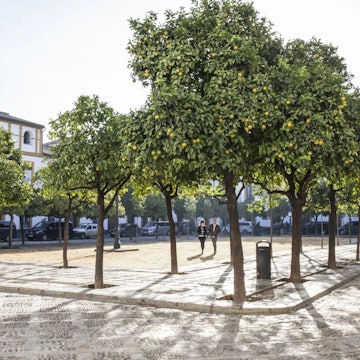
This Spanish town is enticing remote workers with affordable rent - here's how you can take up the offer

Sep 1, 2022 • 5 min read

Spain has new policies in the pipeline aimed at remote workers © Tempura / Getty
The rural village of Letur, perched at the edge of a rocky plateau in the Sierra del Segura region in southeastern Spain, is betting big on digital nomads being a lifeline for its waning population of 900.
A new initiative, Repuebla Letur (repopulate Letur), is offering remote workers the chance to live in one of ten newly-built and fully furnished two-and three-bedroom apartments in the center of the village for rents of between €340 and €450 a month, excluding utilities. Plans are also underway for a co-working space with high-speed internet connection nearby.
“We want to give people who are tired of living in cities a ready to move into a home with furniture, appliances, everything that a family needs to enjoy a pleasant life here,” Carlos García Osío of El Cantero di Letur, the Letur-based organic dairy farm behind the initiative, told Lonely Planet. The hope is that the arrival of new residents will ensure that key services such as the school and the doctor’s surgery remain open in the village.

How to work remotely in Letur, Spain
The deal is open to anyone who works remotely and García Osío and the village’s other inhabitants are hoping that their new neighbors will eventually come to think of Letur as home. “As long as people continue to telework and fulfill all their requirements, they can stay 10 or even 20 years,” he says. The first step is reaching out via their website, repueblaletur.com.
It hasn’t taken long for news of the program to spread: launched in July, five of the 10 houses are already occupied. García Osío admits the international attention has taken them by surprise, as the original intention was to attract Spanish nationals or those already with Spanish residency. But as long as people can legally live in Spain, and are willing to declare Letur as their official residence, he says they are welcoming of all nationalities. Priority, however, is given to families with children under 12 who intend to enroll them in the local school.
Those that do make the move will find that, despite its shrinking population, there’s still plenty of life in the mountain village, including five bars and restaurants, a choice of supermarkets and general stores, and a calendar of cultural festivals. When he wants to catch the latest cinema release or visit a shopping center, García Osío gets in his car (public transport serving Letur is patchy, he cautions) and drives to Albacete, an hour away. The nearest airport is Murcia, about a 1:30 drive.
Trail magic happens all the time on Spain's best hikes

Life as a digital nomad in Spain
Among the remote working community, Spain has a reputation as one of the best countries in Western Europe. “The lifestyle, the food, the people, the prices and the weather all make it an amazing place to be a digital nomad,” says Sally Fox, a British freelance copywriter based in the northwestern province of Galicia.
The cost of living is also a major drawcard. “Compared to other European countries I’ve visited, you can definitely make your money go a lot further in Spain,” says digital nomad Han Talbot, who hosts The Remote Life podcast.
Unforgettable experiences off the beaten path in Spain
Rising costs in some of Spain's cities
Be prepared, however, for higher prices in Madrid and Barcelona, as well as more competition for accommodation. In return, you’ll find a thriving co-working scene on your doorstep. “There are literally hundreds of co-working spaces in Madrid and Barcelona alone,” says Cepee Tabibian, the Malaga-based founder of shehitrefresh.com, a community connecting like-minded female travelers aged 30 and over.
But savvy nomads also find workspaces — and savings — by thinking out of the box. “I’d always recommend looking into whether there’s a good library nearby before paying for a coworking space unless you need a second monitor or are after the social side of things,” says Katie Uniacke, a British translator and copywriter currently in Zaragoza.
If your plan is to embrace cave life in Grenada (as Uniacke did when she first arrived), you may have to brace yourself for patchy internet, but, as a general rule, internet connectivity across the country is fast and reliable. “If you want to be perfectly sure that you’ll stay connected at all times, check available roaming options or buy a local Spanish SIM card with an internet plan that will suit your needs,” advise Sonia Falana-Wysocka and Wojciech Wysocki, a Polish couple who blog about slow travel and nomad life at happylittletraveler.com.
8 unmissable cities to visit in Spain

Visas for digital nomads in Spain
As it currently stands there’s no digital nomad visa for Spain. But there are hopes that the Startups Law, a path for remote workers to settle in the country, will come into force in the next few months. Under the law, eligible entrepreneurs and remote workers will be granted a visa for up to five years and be subject to a special non-resident income tax bracket.
Until then, the visa situation remains complicated for nomads not in a possession of an EU passport. While all non-EU nationals, including US and British citizens, can enter Spain on a tourist visa and stay for a maximum of 90 days within a 180-day period, no business activity — including remote working —- is permitted.
One workaround has been the non-lucrative visa, designed for people who can prove they financially support themselves without working. Under its terms, working in Spain isn’t permitted, although previously working remotely for a company based outside the country had been permitted. “In 2019, Spanish consulates in the US started denying applications that mentioned remote work or any type of lucrative activity,” explains Tabibian. “Still some applicants choose not to reference their remote activities as in practice many people still work remotely under this visa as there is a grey area of interpretation in the law.”
EU citizens who base themselves for longer than three months in the country need to register for a Tarjeta de Residencia, or residence certificate. To do so, you’ll need to show proof of a permanent address.
Take your Spain trip with Lonely Planet Journeys
Time to book that trip to Spain
Lonely Planet Journeys takes you there with fully customizable trips to top destinations–all crafted by our local experts.























